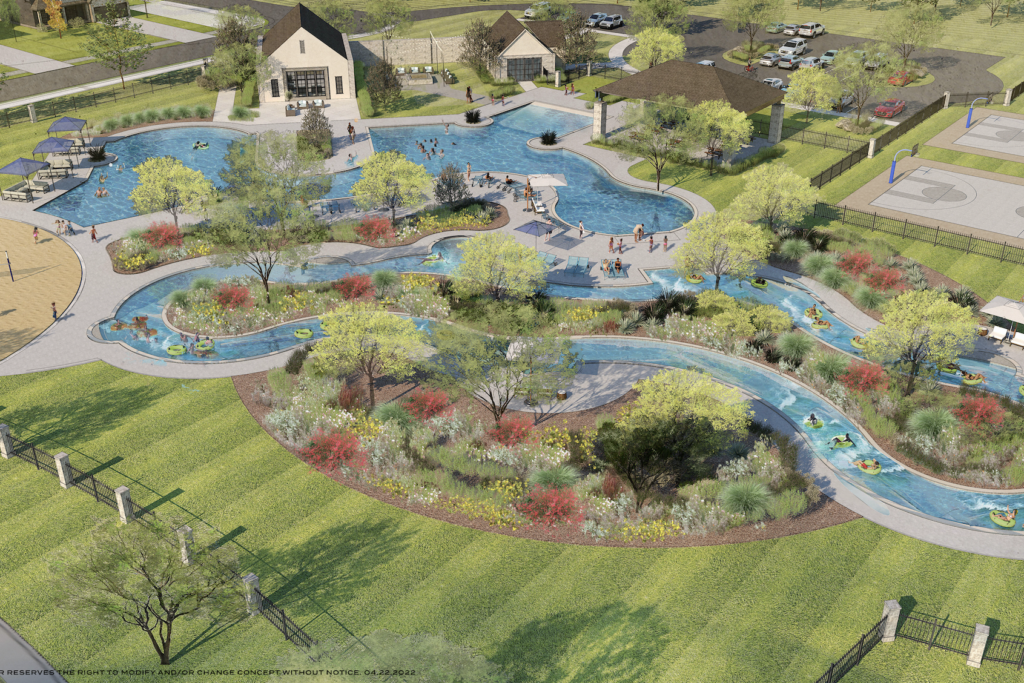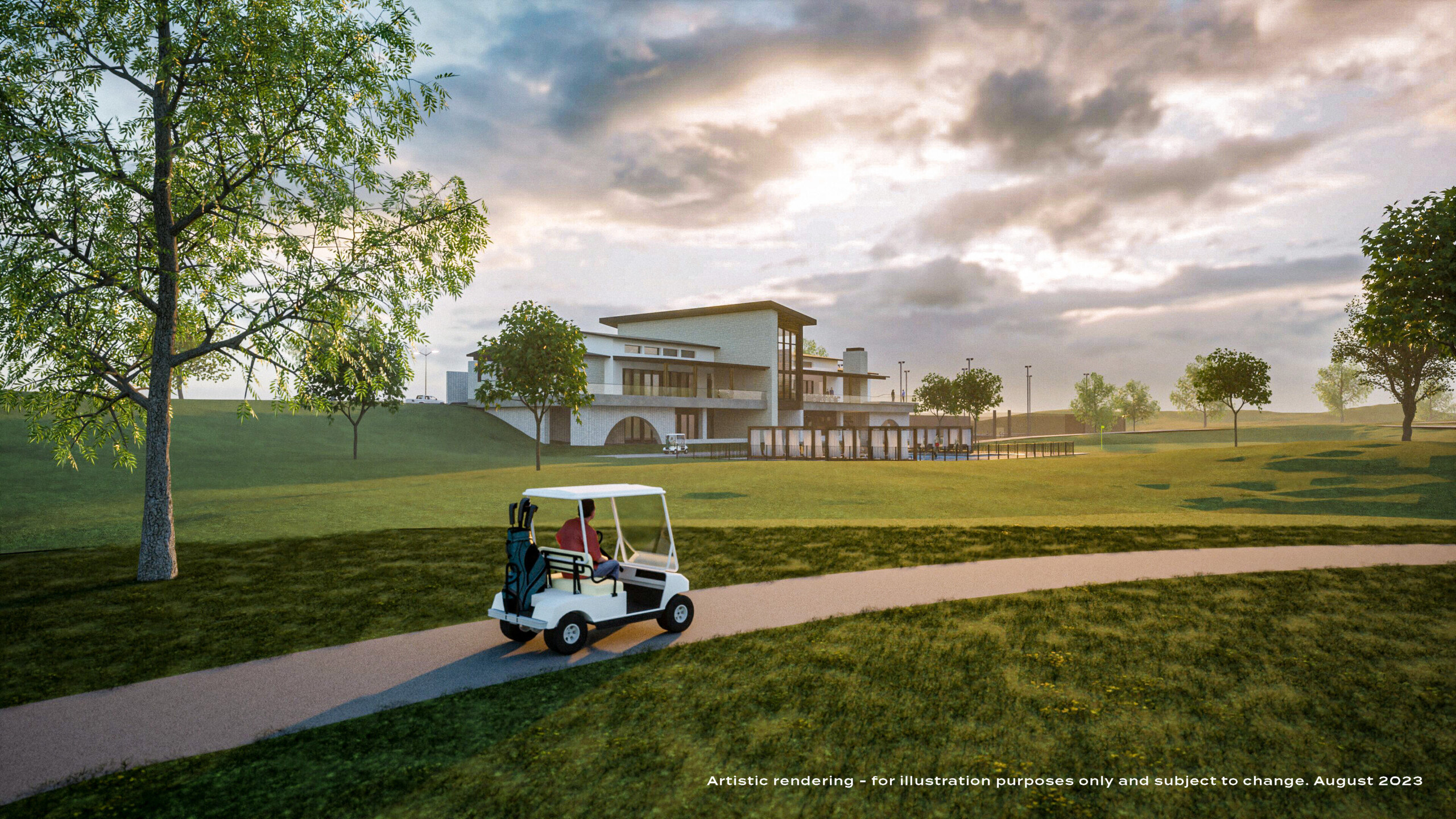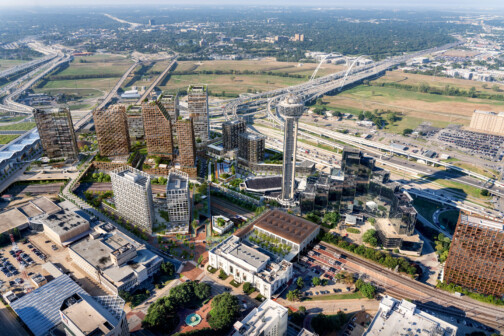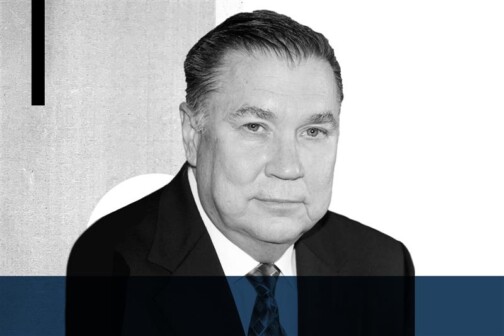Forty years ago, Rex Glendenning brokered the sale of a 3,200-acre plot of land in Celina for $3,500 per acre to a buyer that eventually morphed into the Dynavest Group. Fast forward to 2021, Dynavest was readying a sale. And on the other side of the deal was Glendenning.
This time, he, alongside co-broker Charlie Adams, was representing the buyer, Centurion American. The Farmers Branch-based developer ended up paying more than 10 times more than what Glendenning sold it for in 1983.
Over the next 10 to 15 years, that land will morph into Legacy Hills, a $4.5 billion mixed-use development that’s planned to include 7,000 single-family homes, 4,000 multifamily units, 366 acres set aside for mixed-use development, 100 acres of commercial property, and 1876 Country Club, Celina’s first golf course and private country club. Work is already underway. The project’s first 2,000 homes will be delivered by February, and the $16.6 million golf course is on pace to open in the fourth quarter of 2024 or the first quarter of 2025.
Leading the way is Centurion American’s CEO Mehrdad Moayedi, who’s brashly straightforward about the return on investment prospects the development holds. “[The city is] going to make so much money it’s not even funny,” he told D CEO.
Glendenning, whose family first settled in Celina in 1887, doubles down: “This deal, in my opinion, will be the No. 1 grossing monetary project that Centurion American has ever done.”
Over the last decade, Centurion American has redeveloped the iconic Statler Hotel and Residences, made significant progress on the $1 billion reinvention of Collin Creek Mall, and broke ground on the $300 million CityPoint mixed-use project in North Richland Hills. It’s also at work on residential communities in Euless, Little Elm, Rowlett, Aledo, Forney, Lewisville, Pilot Point, Plano, Crandall, Anna, and Argyle.
Prior to Centurion acquiring the land in 2021, the late developer Chris Bright and his Bright Realty team had been working with Dynavest to entitle the property with the city of Celina. But litigation between Dynavest and Celina resulted in a fallout.
“We had a pre-annexation development agreement going [with Bright Realty],” former city manager for Celina Jason Laumer told D CEO. “But it was a really complicated deal and from what I gathered from the marketplace, only someone like Centurion American could pull it off.”
Land entitlements were shifted, revised, and amended, and the state stepped in to bridge the gap between the two development firms. In August 2021, Centurion American closed on its purchase of the land.
“The only person I’ve done business with who understands how to masterplan, basically, a city in itself is Merhdad,” Glendenning says.
During negotiations, Centurion American was told it had to build a $10 million sanitary sewer treatment plant to service the project, which rests on hundreds of acres of floodplain. “Most developers would probably swallow their tongue if they were told that during the transaction, but Merhdad and Centurion were able to make it work,” Glendenning says.
Today, that plant serves more than 10,000 acres in the northwest sector of Celina. “This land is turning from an outhouse into a penthouse,” Glendenning says.
Moayedi says the project will double the size of Celina. It will certainly boost the city’s coffers. Former Celina mayor Sean Terry, now a VP at Centurion American, puts numbers behind it: “This development will create over $2 billion of property taxes going to the city,” he says.
In early fall 2021, the time came for Centurion American to pull together the builders and financial commitments for Legacy Hills. In just 60 days, Moayedi was able to wrangle capital commitments ranging from $10 million to $12 million from six builders and two additional builders committed significant earnest money. Post-closing, two more builders joined the deal.
The builders include Ashton Woods, Beazer Homes, DR Horton, Del Webb, First Texas Homes, Lennar, Mattamy Homes, M/I Homes, Pulte Homes, and Starlight Homes. Within the next 90 days, Legacy Hills will have its first handful of homeowners.
Inside the 1876 Country Club
Designed by Lee Singletary, Celina’s first golf course (named for the year Celina was founded) will be a mix between parkland-style and links-style golf, said Brock Babb, who’s heading up golf course development for Centurion American.
It will offer as much as 60 feet of elevation change on several holes and a 30-foot-deep creek winding through 14 of the 18 holes. The length will top out at 7,400 yards from the tips, and there will be five different water hazard ponds.
The course itself will cost upwards of $16.6 million to build. That’s not inclusive of the cost of the clubhouse, which will include private locker rooms for men and women, golf simulators, tennis courts, a swimming pool, a cigar lounge, outdoor and indoor dining, outdoor and indoor bars, and event space. “When it’s all said and done, the cost will be well north of $25 million,” Moayedi says.
Centurion American kicked off membership sales in late November. Founding members will be capped at about 150, with a total membership of around 500 people.
The development team has high aspirations for the course. “We’ve already had conversations with the PGA about hosting Korn Ferry Tour events at 1876,” said Terry. “We have a great relationship with Frisco, and being just 10 minutes away from the PGA of America headquarters provides us great synergy. There are not enough golf courses in this northern sector that have the type of high-end amenities we will boast.”
Fighting Through the Headwinds
Moayedi hints at plans to add two more unannounced amenities to Legacy Hills. “They will be huge—nothing like them in the state of Texas,” he says.
Centurion American has been approached by at least two boutique hotels that have expressed a desire to build next to the country club. But developing the land hasn’t come without challenges.
When Moayedi and company purchased the property in 2021, interest rates were fluctuating between 3.5 percent to 3.7 percent. Fast forward a year to 2022, when infrastructure was first being laid in the ground, rates rose to 8 percent. Now, at the close of 2023, rates are sitting around 9 percent.
Moayedi has been able to plow ahead with institutional and municipal financing rather than local bank financing.
“Legacy Hills will be priced far better and superior to what our competition can do,” Moayedi says. “Just the sheer velocity of the project is not something others can do [in this market] if you try to get every dollar out of every lot. You have to make it a better deal for the homeowners and builders, and that’s what we did.”
Centurion American expects a four-bedroom, 3.5-bath home in Legacy Hills to go for between $400,000 to $450,000.
“In the next year or two, we’re going to hit some velocity headwinds,” Moayedi says. “But Legacy Hills is gonna be the one development selling more than any other neighborhood, I promise you.”
The developer doesn’t want to put a concrete timeline on when Legacy Hills will be fully developed, but he does expect buildout to occur within the next 10 to 15 years. As development continues, Glendenning, Moayedi, and Terry all expect Celina to follow the same trajectory that has occurred in Frisco.
“Celina’s growth will be a mirror image of what went on in Frisco,” says Glendenning, who was a main player in getting the Dallas Cowboys to move its headquarters to The Star in Frisco. “But I want my city to be No. 1; I don’t like being runner-up.”
Author









